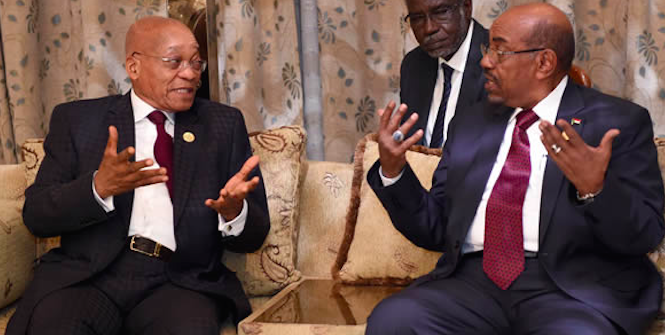Bashir’s Escape: The Sound of the Death Knell for the ICC?

The Sudanese President’s escape from South Africa is a blow to the International Criminal Court. The missed opportunity to arrest al-Bashir does not sound the death knell for the ICC, but it calls into question the role of the sovereign state within this sordid affair.
Sudanese President Omar al-Bashir’s escape from South Africa in the face of two arrest warrants from the International Criminal Court (ICC) this month must be considered as a blow for the advocates of international criminal justice.
President al-Bashir is the subject of two arrest warrants from the ICC, which have been in place since 2009 and 2010. His warrants contain charges of crimes against humanity and war crimes relating to attacks upon civilians. There are also counts of genocide. All are very grave and significant crimes levelled against the sitting head of state of Sudan. The crimes that are alleged to have taken place form part of the often forgotten and bloody conflict which has been plaguing Sudan for a number of years.
Al-Bashir was visiting South Africa for the Summit of the African Union, which was hosted by President Jacob Zuma. The official story from the South African administration is that al-Bashir slipped away, and that the South African authorities lost him. However, other sources suggest that the South African administration was complicit in al-Bashir’s escape. In any event, in the face of warrants which South Africa, a state party to the Rome Statute constituting the ICC was compelled to enforce, and pleas from the President of the Assembly of State Parties to the ICC to effect this arrest, South Africa’s actions show blatant disregard for international criminal justice as enforced by the ICC. Even the highest Court in South Africa has expressed concern at the government’s outright refusal to comply with its international legal commitments in its failure to arrest.
In a case that has been marred previously with failures to arrest and extradite from Malawi, Chad and the Democratic Republic of the Congo, this was not the response that the ICC was hoping for. But does this incident sound the death knell for the ICC? It would be easy to conclude that the answer to this question is yes. After thirteen years of operation, the Court has reached guilty verdicts in two cases. There are countless other defendants being held in custody pending trial. Australian courts would be derided and reformed for such a poor record of prosecution, if these statistics applied to any of them.
However, most courts do not have to deal within the constraints of being a treaty based Court, which is reliant upon the will of the states party to the treaty to assist in its endeavours. The ICC will only be as effective as the states party to the Rome Statute allow it to be. If the states ratify the Statute, but fail to properly implement it in the spirit of universal criminal justice, the Court will become a toothless tiger.
Of course the Court has questions to answer regarding its record, expenditure, and at times poor evidence handling. The Court is also required to answer questions about why the two guilty verdicts in Lubanga and Katanga were delivered in relation to people who may be seen as mid-tier players in very complex political conflicts, and not the core agitators of those conflicts. There is also the question of why the Court is only drawing cases from the African region. But if the states are not willing to effect the orders of the ICC, there remains no incentive for the Court to change and develop. All of these questions are rendered moot, without the compliance of the states.
The missed opportunity to arrest al-Bashir does not sound the death knell for the ICC, but it calls into question the role of the sovereign state within this sordid affair. As long as states remain the central authority within global politics, they can act with impunity. Organisations like the ICC can try, in vain, to bring criminals to trial but these efforts, sometimes flawed, can be stymied by lack of compliance from states. Instead of criticising the ICC, it is perhaps time that doctrines of sovereignty and state responsibility were revisited instead. The ICC is still in its infancy, and is trying to bring an end to impunity for international criminal law, but to do so, it requires the assistance of the states who have signed up to it.
Josh Pallas is a Research Assistant in Politics and International Studies at the University of Wollongong. He has completed an Honours Thesis on Sexual Violence Trials in the ICC. He can be contacted on twitter: @joshpallas. This article can be republished with attribution under a Creative Commons Licence.





